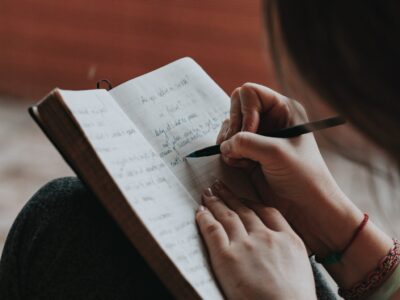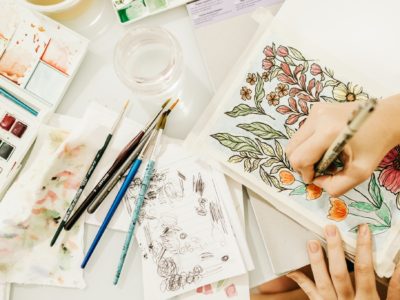In a box, beneath my bed back home, you’ll find my life. Notebooks thick and tall, thin and compact stick out every which way as if locked in an eternal attempt to escape. The prolific scratchy pencil and inky pen scrawls that fill the pages might suggest some sort of expertise when it comes to my journaling. Although the contents of my journal might look a bit messy, it serves its purpose: to help me think through things and remember past experiences. I did not always feel content with this natural messy style my journaling habits usually fall into. In fact, for most of time I’ve journaled—which, according to the helpful record of my elementary scribble, began around the age of five—I felt convinced I was doing it “wrong.”
To start with, I could never commit to a regular writing schedule.
A constant back-and-forth, my writing habits jumped all over the place. I would feel accomplished for sticking to a daily schedule for a week or so, but abruptly my journaling habits would take a sabbatical, and I’d forget to write for weeks or months on end. Actually, almost every journal in that overflowing bin beneath my bed starts with a quote along the lines of “Here’s to hoping I can be more consistent this time.”
Then came middle school, and the consciousness of writing style. Suddenly timing did not make up the only inconsistency in my journals—a bigger concern became the lack of continuity in tone day to day. From narratives of a day or experience, to in-depth discussions of my thoughts on a seemingly random topic, to quick jotting down of conversations, my entries varied. Plagued with the idea that I needed to commit to a specific style, I often found myself flipping, disheartened, through the irregular tone of past pages.
Where exactly these arbitrary rules of journaling became instilled in my mind, I don’t know.
From conversations with friends who journal, though, I do know I’m not the only one once haunted by inconsistency. The concept that it shouldn’t matter—that journaling should intend to fulfill a personal purpose for you, and therefore you get to make the rules—now appears glaringly obvious. But it never occurred to me until junior year of high school. At that point, I journaled almost every day not because I actively tried keeping to a schedule, but because I found it helpful for managing stress. Running my fingertips along the smooth bumps of my inky scrawl, the idea struck me:
A journal isn’t meant to be pretty—it’s meant to be written in, stained with scribble, the binding creased and the pages well-worn.
The realization that I had no reason to follow those arbitrary rules of journal consistency led me to reconsider what journaling actually means to me. Joan Didion, in her essay “On Keeping a Notebook,” wrote “Remember what it was to be me: that is always the point.” In many ways, I agree with her sentiment. I find the ability to look back on past entries to reflect on my past self versus my current self incredibly valuable. At the same time, however, I never wrote for the purpose of reflecting later. Instead, I wrote for the purpose of reflecting in the moment—thinking through what I felt and experienced on a given day, whenever I needed.
That aha moment also enabled me to explore my journaling more stylistically. In addition to my regular thoughts, lists and lines of poetry, I tuck away clippings of pamphlets, newspapers and other scraps relevant to what I’ve done. Some entries begin “A list of things to look forward to this week.” Other times there’s no way to begin without a sudden spillage of thoughts—“I’m turning 20 in less than 2 weeks, and I think it scares me more than anything.” Still other entries will simply consist of a taped-down ticket stub from a night out with friends, or a series of doodles.
The personalization of my journaling process also crossed over into other hobbies and interests.
Although I find it tempting to write-off my previous concerns about the amount I journaled (or didn’t journal) as absurd, I have to stop myself. The list of hobbies I felt the need to quantify and do “correctly” didn’t stop at journaling. In middle school and high school, I kept track of how many books I read annually, always trying to beat the previous year. Soon I found I read not because I enjoyed a story or wanted to learn something new, but because of a concern I wouldn’t reach my numeric goal. Similarly, never as naturally talented an artist as many of my friends, I gave up on learning to draw around middle school. In reality, of course, the purpose of a hobby should not include becoming the “best” or doing the “most”—it should include expressing yourself and finding enjoyment in an activity.
None of that means, though, that you shouldn’t set reading goals or focus on improving at a specific task, if that’s what works for you when it comes to hobbies. Instead, it means that you don’t have to quantify your enjoyment or turn it into a personal competition. Whether you journal, enjoy another hobby or want to pursue an activity you possess no previous experience in, do it the way you want to do it. Remember: your hobby belongs to you.






















